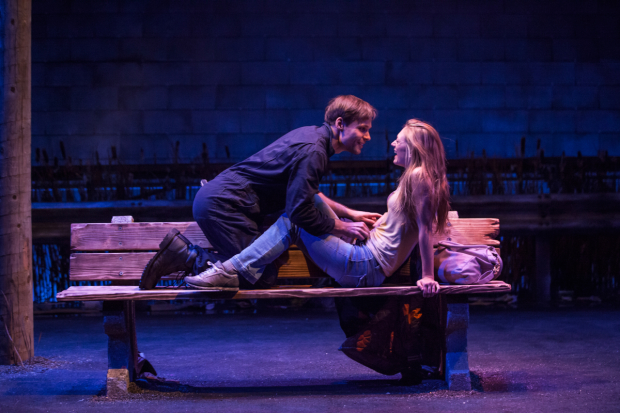Ironbound Presents a Woman's Life of Struggle and Strong Will

(© Chris Whitaker)
Darja, the lonely, unfulfilled antihero of Ironbound, at the Geffen Playhouse, grants actor Marin Ireland a showcase for her vast talents. In lesser hands, Darja, a woman who seems to live only to survive, is a character that could turn off audiences, but Ireland finds Darja's unsinkable core and hooks us along with it.
Set over the course of 22 years, Darja, a Polish immigrant worker, sits on an isolated park bench and waits. At age 20, she contemplates her life with her first husband, Maks (Josiah Bania), a fellow immigrant with limited options. Maks wants to move to Chicago and play the blues with his harmonica, but Darja knows they need money, serious money, to support their unborn child. Fifteen years later, beaten by a second husband, she waits under the same bench to die. But a young boy (Marcel Spears) offers her a temporary lifeline. Seven years after that, she waits for the bus while Tommy, her cheating boyfriend (Christian Camargo), lectures her and makes endless excuses. There are no happy endings in Darja's life, not even the glimpse of possibilities, and yet she still waits.
Darja is a complicated central character. During the three eras the play finds her in, she remains trapped by her circumstances of poverty, crummy choices, and always running on empty. But there's still spirit in this immigrant, who cleans rich women's houses, suffers through slave labor in a paper factory, and relies on the useless men who always let her down. Playwright Martyna Majok never lends Darja false hope. Instead, she allows the audience to rally around her instincts.
Ireland plays Darja like a fly caught in an impenetrable web her entire life. But like the fly, instead of giving up, she struggles rather than accepting her fate. Puffy, strung out, and waifish, she's a modern Fantine who's as bound by her cages as the Les Misérables character. Her Eastern European accent is spot-on and her voice wavers as would that of one still learning a complicated language.
Bania, as the youthful Maks, exudes unbounded glee. He sees opportunity where his character's wife sees only black holes. Strumming his guitar and promising new prospects in Chicago, he is a contrasting mirror image of Ireland. Spears is engaging as a teen who is loquacious and generous to a fault, but able to recognize a life worth saving. Camargo, with a thick Jersey twang, bolts around the stage like a pinball, being both accusatory and duplicitous, always yelling so as not to allow his partner an opportunity to think.
Director Tyne Rafaeli presents the bus stop as Darja's purgatory, a remote wasteland where dreams go to die. The stale air visualized by Lap Chi Chu's lighting, the dimness of the lamppost and the dead high grass on Tim Mackabee's roadside set, and costume designer Elizabeth Caitlin Ward's paper-thin jacket that barely keeps Ireland warm, all paint a picture of inertia. Unfortunately, the sound design leaves the audience frustrated at times, straining to hear Ireland when she faces the opposite side wings. In several scenes, Ireland's dialogue went with the wind.
Ironbound is a challenging character study of a life without options, but a life nonetheless. Marin Ireland suffuses determination in the role and bewitches the audience with her character’s iron willpower.











